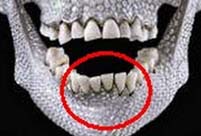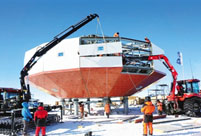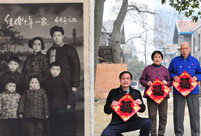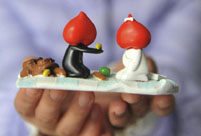 Amazing cliff diving in cold winter
Amazing cliff diving in cold winter
 Enjoy Sochi 2014 in slow motion
Enjoy Sochi 2014 in slow motion
 University student sentenced to death for poisoning roommate
University student sentenced to death for poisoning roommate
 Chinese lunar New Year celebrated in San Francisco
Chinese lunar New Year celebrated in San Francisco
 Taiwan Lantern Festival 2014
Taiwan Lantern Festival 2014
 Haiyang Yangge: make up
Haiyang Yangge: make up
 China's top 10 richest cities
China's top 10 richest cities
 President Xi visits garrison troops in Inner Mongolia
President Xi visits garrison troops in Inner Mongolia
 Turnip sculptures amaze tourists in Qingdao
Turnip sculptures amaze tourists in QingdaoWASHINGTON, Feb. 20 -- U.S. President Barack Obama and German Chancellor Angela Merkel agreed on Thursday to coordinate with the European Union (EU) in their response to ongoing violence in Ukraine.
In a telephone talk between the two leaders, they underlined the importance of coordination in supporting "an end to the violence and a political solution that is in the best interests of the Ukrainian people," the White House said in a statement.
In a separate statement issued earlier Thursday, the White House urged Ukrainian President Viktor Yanukovych to "immediately withdraw" his security forces from downtown Kiev and resolve the conflict by political means.
"We are outraged by the images of Ukrainian security forces firing automatic weapons on their own people," the White House said, urging the Ukrainian government to respect the right of peaceful protest, and the protesters to "express themselves peacefully."
The White House was responding to the escalation of violence in downtown Kiev, the capital, between security forces and protesters, in which Kiev City Administration said at least 67 people have been killed in three days of mayhem.
Meanwhile, EU Foreign ministers on Thursday agreed to adopt sanctions against Ukraine, including asset freezes, visa bans and ban on exporting anti-riot equipment, EU foreign policy chief Catherine Ashton said.
Ashton told a press conference following the meeting that the violence in Ukraine should be ended immediately and any further escalation should be avoided, saying "those were responsible for human rights violations should be brought to justice."
On Wednesday, Obama, while on a visit to Toluca, Mexico for a summit with Mexican and Canadian leaders, urged the Ukrainian government to "show restraint" and "not resort to violence" in its handling of the protests.
In another step to exert pressure on the Ukrainian government, Washington on Wednesday imposed visa bans on some 20 senior Ukrainian officials and others it accused of being behind the violent crackdown on protesters in downtown Kiev.
Protests in Kiev began in November after Yanukovych backtracked on a trade deal with the EU and tilted toward Russia instead. They turned violent in mid-January and have been remarkably escalating this week.
 Most gorgeous female celebs in Chi-pao
Most gorgeous female celebs in Chi-pao Second round of test kicks off at Beijing Film Academy
Second round of test kicks off at Beijing Film Academy Ancient Qiang people had vertically grown teeth
Ancient Qiang people had vertically grown teeth Top 10 Chinese youth’s favorite seaside destinations
Top 10 Chinese youth’s favorite seaside destinations Traditional Tibetan clothing tailors
Traditional Tibetan clothing tailors In photos: Unveiling Taishan station
In photos: Unveiling Taishan station Beautiful moments of family reunion
Beautiful moments of family reunion 10 Valentine's Day ideas for couples
10 Valentine's Day ideas for couples Let's get married today!
Let's get married today! Chinese warplanes C919 to appear at Singapore Airshow 2014
Chinese warplanes C919 to appear at Singapore Airshow 2014 Ruins of Shang Dynasty's structure unearthed in Shaanxi
Ruins of Shang Dynasty's structure unearthed in Shaanxi  Intercity high speed train in operation
Intercity high speed train in operation Severe coldness freezes large parts of China
Severe coldness freezes large parts of China  Beautiful moments of Sochi
Beautiful moments of Sochi  It's not just performing this year
It's not just performing this yearDay|Week|Month